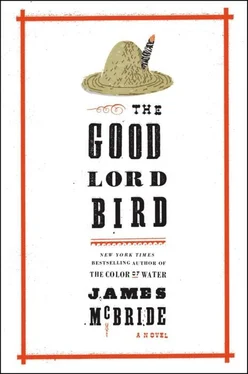It was on the train that I learned that John Brown was a poor man. He had a large family, even by prairie standards he birthed twenty-two children altogether with two wives. He outlived the first wife and still had the second one living in Elba, New York, along with twelve children, them that weren’t killed off through sickness and disease. Most of his young’uns at home was knee-high children or girls, and he constantly scooped up small items and remembrances for them on the train to Boston, such as colorful paper and spools of thread he found tossed about on the passenger car floor, saying, “I’ll give this one to Abby,” and “This would delight my little Ellen.” It was there that I come to understand how guilty he felt for my Pa getting kilt when he first kidnapped me two years prior. He’d given me a store-bought dress he’d got for his own daughter Ellen. The Old Man never bought his goods in any store. That store-bought dress had long wore out by then. I was sporting a fine embroidered number I’d gotten from Pie when he found me in Pikesville. But that gived way on the plains to trousers, undergarments, shirt, and hat, all stolen, course, which I was allowed to wear on account of the fierce weather. The Old Man seen I took to that clothing and it delighted him, for he figured me as being a tomboy of sorts, which generally amused him. Rough and gruff as he was, he was kindhearted to every child he come across. Many a time I seen him set up all night with a colicky colored child who was part of whatever exhausted band of runaway Negroes he was slinging along to freedom. He’d feed her as her tired parents slept, pouring hot milk or soup down her throat, and sing her to sleep. He pined for his own little children and wife, but seen that his fight against slavery was more important than them.
He spent most of the journey reading the Bible, studying maps, and writing letters. You never seen a man write more letters than Old John Brown. He wrote letters to newspapers, politicians, enemies, his wife, his children, his old Pa, his brother, and several cousins. He received letters from his wife and creditors, mostly—considerable amounts from creditors, for he outworked a cooter in the borrowing department in the old days and owed money on every business he’d owned which gone belly-up and there was considerable numbers of them. He also got letters from Negroes on the run and even Indians asking for help, for he was partial to the red man as well. In most every town where the train stopped, he had some friend or other living there who could post letters for him, and, like as not, when the train stopped to pick up passengers, a child would leap aboard or hand him through the window a bunch of letters addressed to him, for which the Old Man passed him a shilling, then throwed a bunch of letters at him to mail. A few letters arrived with a bit of money in them, from his supporters back east. Which was one reason why letters was so important to him. When he weren’t writing letters, he constantly scribbled on maps, several small ones and one big one. He carried that thing rolled up like a large scroll, and unscrolled it and scratched at it constantly in pencil, scrawling numbers and lines, muttering about troops and flanking maneuvers and so forth. He’d sometimes set it down and walk the railroad car, pacing back and forth, figuring. The other passengers was mostly finely dressed businessmen from Missouri, Pro Slavers, and to them, the Captain walking the aisle bearing two seven-shooters barely hidden inside his ragged frock coat and the broadsword sticking out his gunnysack, along with a colored child dressed in farm trousers and hat, was quite a sight. Other than a few Yanks who offered him a nibble or two for himself and his “consort,” nobody much bothered him.
The journey to Boston was supposed to take four days, but on the third day, as we swung through Pittsburgh, Pennsylvania, the train stopped to take on water, and he announced, “We are getting off here, Onion.”
“I thought we was going to Boston, Captain.”
“Not directly,” he said. “I suspect there might be a spy among my men in Iowa. I don’t want the federal hounds to catch us.”
We hopped another train in Pittsburgh for Philadelphia, and got off there for a day to wait for the next train to Boston which weren’t due to leave till morning, whereupon the Old Man decided to walk about the city for he was an outdoor man and couldn’t bear the thought of setting by a warm woodstove in the station and resting his feet. That city was right enjoyable. The sights and colors of it whirled up before my eyes like a peacock’s feathers. Even the smallest street in Philadelphia made the biggest road in Kansas Territory seem like a rutted back alley, full of nags and chickens. Folks in fine clothing strutted about; and there were homes of red brick with perfect, straight chimneys. Telegraph wires, wooden sidewalks, and inside privies lined every street. The trading stores were loaded with fresh poultry, cooked fish, brass candles, ladles, cradles, warming pans, hot-water bottles, commodes, brass ware, even bugles. As I took it all in, I decided the Old Man was a fool to leave the east to fight on the prairie on behalf of the colored. Even the colored in Philadelphia didn’t seem to care about their slave brothers. I seen a few of them strolling about, sporting pocket watches, walking canes, breast pins, and finger rings just like white folks, they were right dandy. In fact, they was dressed better than the Old Man.
The next morning, at the train station, the Old Man, he got into a wrangle with the ticket agent, for he was nearly out of money and had changed his mind about going to Boston straight off. Instead he wanted to stop off at Rochester, New York, first. That stretched him to the limit, and he spent his last money getting the tickets changed. “You perhaps question why I am spending my last before we get to Boston,” he said. “Fret not, Onion. We will find more funds where we’re going. It is worth the cost of ten tickets to Boston, for we are going to meet with the king of the Negro people. He is a great man and a dear friend. Have no doubt, Onion, that in the coming years his exploits will be heralded across this country for generations, and you will be able to tell your children that you have met him. He has promised to fight with us to the end, and that is important, for we will need his help in our cause, to hive the bees. We will need thousands of Negroes, and with him, we will get them. So be kind to him. And polite. He has promised to fight with us. We must convince him to keep his promise to help us hive the bees.”
We arrived at Rochester station in the early morning, and as the train pulled in, there upon the platform stood a Negro unlike any I’d ever seen. He was a stout, handsome mulatto with long dark hair parted in the middle. His shirt was starched and clean. His suit was pressed and flat. His boots spotless. His face was shaved and smooth. He waited still as a statue, proud, erect. He stood like a king.
The Old Man descended the train, and the two shook hands and embraced warmly. “Onion,” he said, “meet Mr. Frederick Douglass, the man who will help lead our cause. Frederick, meet Henrietta Shackleford, my consort, who goes by the name of the Onion.”
“Morning, Fred,” I said.
Mr. Douglass looked at me coldly. Seemed like the bottom of his nose opened up two inches as he peered down.
“How old are you?”
“Twelve.”
“Then where is your manners, young lady? What kind of a name is Onion for a young lady? And why are you dressed in that fashion? And why do you address me as Fred? Don’t you know you are not addressing a pork chop, but rather a fairly considerable and incorrigible piece of the American Negro diaspora?”
“Sir?”
“I am Mr. Douglass.”
Читать дальше












